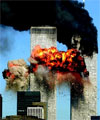Blog
9/11: Ten Years Later
- Details
- Category: Blog
- Published: Saturday, 10 September 2011 19:00
 Reflections on the most significant event of this generation. I heard a story recently about a young man who was walking around the streets of New York not long after the Twin Towers of the World Trade Center had collapsed. An old woman stopped him and said, “I feel sorry for you.” When he asked why, the old woman said, “Because it is your generation that will have to deal with this.”
Reflections on the most significant event of this generation. I heard a story recently about a young man who was walking around the streets of New York not long after the Twin Towers of the World Trade Center had collapsed. An old woman stopped him and said, “I feel sorry for you.” When he asked why, the old woman said, “Because it is your generation that will have to deal with this.”
And it’s true: Sept. 11, 2001, was a startling reminder of just how suddenly and completely our lives can change—how easy it is on a Tuesday morning, under a brilliantly blue summer sky, for a small group of strangers to alter the course of our stories—and how quickly we can veer from action to reaction, and from unbridled optimism to something else.
A decade later, people all around the world are still living in the shadows of the fallen towers and the smoke rising from the Pentagon and the remains of a plane in a southern Pennsylvania field. Canadians of a certain age mark time with it. On the 10th anniversary of the 9/11 attacks, we offer reflections from writers on what that fateful day meant for them and what they’ve learned since.
What Time Is It, Lord?
by Richard Dahlstrom
Sept. 11, 2001, was our scheduled annual meeting at the church I lead in Seattle. We gathered, ditched the agenda and spent most of the evening in prayer. I’ll never forget someone crying out with pathos: “God, you said in Ecclesiastes that there’s a time for everything …” He stopped and the room waited in a pregnant silence for him to continue. In a broken voice he finally cried out: “What time is it, Lord? What. Time. Is. It?”
Ten years later, it’s still a question that needs asking.
Is it time to argue about whether the emergent church is superior to the neo-Calvinist movement, giving voice to the same kind of polarization found in our politics? If the answer is yes, we’ll fill the blogosphere with debates about who’s headed for hell and who’s not, who’s pure and who are sons of Satan. The world will shake their head and say, ironically, “Jesus, save me … from Your followers.” No. It’s not the time for these things.
In a world where dictators and extremists continue to oppress, torture, rape and indiscriminately kill, what time is it? Time to fight? Time for vengeance? Time for moving to the desert? Time for fear and banning mosques? It’s not time for these things either.
In the midst of human trafficking, rising food prices in the poorest parts of the world, homelessness and 25,000 children dying of treatable diseases every day, what time is it? In a world of rising populations and food shortages, peak oil and polluted water, what time is it? In a world where democracy seems immobilized by a lack of political will, while totalitarianism and terror wait for their moment to seize power, what time is it?
The good news is this: God’s given us the answer. “God has shown you what is good, and what the Lord requires of you: do justice, love mercy, walk humbly with God.” This is the clarion call ringing out above the white noise that, for many, Christianity has become.
Work at giving a voice to those who don’t have one because they’re stuck in the margins. Pursue healthy relationships, which will include extending forgiveness to those who wrong you and confessing your own wrongs. Walk closely with God as friend, guide, lover, so that little by little you’ll start to look like Jesus.
Nurturing these qualities won’t make headlines, but it will cause the light of Christ to shine with just a little more clarity. Ten years after 9/11, I think we all agree what time it is: It’s time for His light to shine brighter.
Richard Dahlstrom’s most recent book is Colors of Hope (Baker). He is Senior Pastor of Bethany Community Church in Seattle, WA and a Conference and Bible School teacher with Torchbearers Missionary Fellowship. Find Richard at RichardDahlstrom.com.
Cold River of Sorrow
by Karen Spears Zacharias
On Monday, Sept. 10, 2001, my daughters and I sat beneath a banyan tree at Punchbowl National Cemetery in Hawaii and watched an aged vet buried. Gray-haired men with bent backs lifted the flag off the casket.
My daughters, raised in Oregon, and far from military installations, had never seen a military funeral. For me, the daughter of a soldier killed in action, that folded flag was entirely too familiar.
Tuesday we woke early to catch the sunrise over Diamond Head. We were due to fly out that morning. As the girls posed for photos, clusters of people gathered on the jetty.
A big-boned woman sat on the rocks, elbows resting on her knees. We stood near her, unaware that death clouds had exploded over New York City, D.C. and Pennsylvania.
“Have you heard?” the lady asked. She had a Brooklyn accent.
“Heard what?” I asked.
“Somebody bombed the World Trade Center.”
I didn’t flinch. I was a reporter and used to headline news. Besides, the World Trade Center had been bombed before.
“Do they know who did it?” I asked.
“No,” she replied. “But they bombed the Pentagon, too.”
I sucked air, as if she’d socked me in the gut. Every Army brat knows the Pentagon is Holy Ground.
“All planes have been grounded, nationwide. There are no flights in or out,” she told me.
Looking up, I noticed the lavender sky was as still as a dead father laid out for the viewing.
Ten years hence, it feels like I’ve been sitting in Oregon’s Umatilla River while spring runoff cuts a sharp course for the Columbia. I’ve been immersed in a cold river of sorrow.
There’s the 21-year-old war widow in North Carolina who spends sleepless nights peeking out from behind blinds, listening for intruders who never come. There was the Vietnam veteran in Tennessee who, even on his deathbed, railed against demons who’d resurfaced in the infrared midnight of new wars. There’s the Oregon mother at the end of the dirt drive, remembering when the UPS driver carried her mischievous son home after the tyke took off down the blacktop. The last time her boy came home it was in a flag-draped coffin.
Lillian learned of her daughter’s death by watching the Today Show. “I knew when they showed where the plane hit that it was Marjorie’s office,” Lillian says. The 87-year-old lives alone back beyond the pecan grove; alone except for the memories of the daughter she grieves more with each passing day.
And there are the not-yet-etched names of the dead and maimed servicemen and women who turned their faces bravely toward the fight, because for them, honor and love is about sacrifice.
You’d think such weeping would rust an old soul, roughen a heart and make it coarse. But it hasn’t. Instead it has freed me to live life more fully, aware that if such things as 9/11 and countries at war in the name of a God abused aren’t worth crying over, somebody, pray tell me, what is?
Karen Spears Zacharias is the author of the memoir After the Flag Has Been Folded (William Morrow), among other books. She blogs at Patheos.com.
Rising Through the Ashes
by Makoto Fujimura
In my studio, I use ground minerals such as malachite and azurite, layering them to create prismatic refractions, or “visual jazz.” Via my art, I hope to create a mediated reality of beauty, hope and reconciled relationships and cultures. I have found mediation of any kind is never black-and-white but prismatic and complex, too. In order to find home, even in the midst of the broken and torn fragments of relationships, in order to begin to journey into the heart of the divide, we must first wrestle with the deeper issues of faith. We must be willing to be broken into prismatic shards by the Master Artist, God, so Christ’s light can be refracted in us.
Three months prior to Sept. 11, 2001, I wrote the following for a Santa Fe art exhibit called “Beauty Without Regret”:
Art cannot be divorced from faith, for to do so is to literally close our eyes to that beauty of the dying sun setting all around us. Every beauty also suffers. Death spreads all over our lives and therefore faith must be given to see through the darkness, to see through the beauty of “the valley of the shadow of death.”
Prayers are given, too, in the layers of the broken, pulverized pigments. Beauty is in the brokenness, not in what we can conceive as the perfections, not in the “finished” images but in the incomplete gestures. Now, I await for my paintings to reveal themselves. Perhaps I will find myself rising through the ashes, through the beauty of such broken limitations.
Outside my window I see the young sycamores, once covered in the ashes of Sept. 11, now turning to autumn hues casting their golden shadows on those passing by. Those who walk beneath the sycamore trees are of diverse cultures and backgrounds. Similarly, the culture at large is neither “Christian” nor “secular” but fantastically pluralistic, defying conventional categorizations. In each culture we will no doubt find evidences of trauma, like the ashes of Ground Zero, as we all find ourselves building upon our pulverized and fragmented past. We can choose to disengage from such intractable reality, as our hearts will struggle to find rest in such exilic ground as Hiroshima, Auschwitz, Darfur, Afghanistan and so on. Or we can accept the splintered condition of culture as a kaleidoscope of common struggles, a reality that only the golden rays of God can restore and recreate via broken humanity.
Makoto Fujimura is an artist, writer, speaker and the founder of the International Arts Movement. The above essay is excerpted from Fujimura’s second book, Refractions: A Journey of Faith, Art and Culture, which is available at NavPress.com. Used with permission.
Dreams of a Better World
by Shane Claiborne
On Sept. 12, 2001, I was talking with one of the kids in my neighborhood, a 10-year-old named Steven who has grown up in the inner city, has seen some hard stuff and is well acquainted with violence. So when I asked him, “What do you think we should do?” he thought pensively and said, “Well, those people did something very evil.”
I nodded.
He went on. “But I always say, ‘Two wrongs don’t make a right.’ It doesn’t make sense for us to hurt them back. That’s not what Jesus wants. Besides, we are all one big family.”
Then his face brightened, and he looked at me wide-eyed and said, “Shane, that means you and me are brothers!”
We laughed, and I thought to myself, Steven, tell that to the world.
There was so much ugliness after Sept. 11. I saw a banner that read, “Kill them all, and let God sort them out.” A bumper sticker read, “God will judge evildoers; we just have to get them to Him.”
It was obvious to me Jesus did not smile down on that hatred. But I wasn’t sure what Jesus would do. Then I began to encounter other voices. One is a group of 9/11 victims that has become known as Families for Peaceful Tomorrows. Initially, these folks who had lost their closest loved ones got together to grieve and to support one other. But as they saw the retaliation begin in the form of more violence, their campaign became: “Our grief is not a cry for war.”
I heard about their pilgrimages to Iraq and Afghanistan, and the stories of reconciliation and grace they brought home—as Afghan and Iraqi families showered them with love and compassion.
I got to follow in their footsteps.
My trips to Iraq and the Middle East over the past 10 years have changed my life, deepened my faith, messed with my politics and challenged my theology. More than anything, I have new friends, and these new friends have given me new eyes to see the world.
Here’s one of the images that will never leave me: As one Iraqi doctor held the bloody body of a child in his arms, he watched the bombs falling from the sky and said: “This violence is for a world that has lost its imagination. Has your country lost its imagination?”
That doctor is right. The world is desperately in need of imagination today. The Christian life is all about having a new imagination.
As Romans 12 says, “Do not conform to the patterns of this world, but be transformed by the renewing of your mind.” It is time for a new Christian imagination in a post-Sept. 11 world.
May we continue to choose the folly of the cross in a world of smart bombs. Jesus, give us the courage to follow Your cross in a world that continues to pick up the sword and die by the sword. Help us love those who hurt us—and may our love wear down their hatred. May our grace dull the sharpest sword.
And may we become people who do not conform to the patterns of this world but are transformed by the renewing of our minds. God give us imagination that we might refuse to accept the world as it is and insist on dreaming of the world as it could be.
Shane Claiborne is the best-selling author of The Irresistible Revolution and co-author of Jesus for Presidentand Becoming the Answer to Our Prayers. He is a founding member of The Simple Way, a community in inner-city Philadelphia.
Courtesy of relevantmagazine.com











